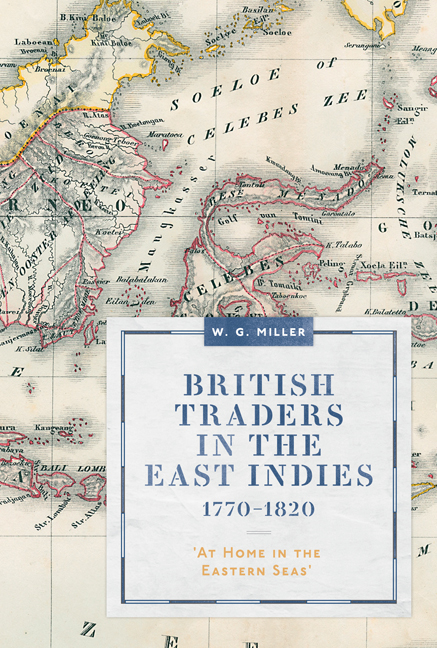Book contents
- Frontmatter
- Dedication
- Contents
- List of illustrations
- Preface
- Acknowledgements
- A note on orthography and unit conversion
- Abbreviations
- Map
- Introduction: the Indian origins of the British country trade
- Chapter One Merchant friends: country traders and the Malays I
- Chapter Two Political allies: country traders and the Malays II
- Chapter Three Inadvertent imperialists: country traders and British officials
- Chapter Four Smugglers and enemies: country traders and the Dutch
- Chapter Five The decline of the country trade in the Malay Archipelago
- Conclusion
- A note on sources
- Bibliography
- Index
- WORLDS OF THE EAST INDIA COMPANY
- Frontmatter
- Dedication
- Contents
- List of illustrations
- Preface
- Acknowledgements
- A note on orthography and unit conversion
- Abbreviations
- Map
- Introduction: the Indian origins of the British country trade
- Chapter One Merchant friends: country traders and the Malays I
- Chapter Two Political allies: country traders and the Malays II
- Chapter Three Inadvertent imperialists: country traders and British officials
- Chapter Four Smugglers and enemies: country traders and the Dutch
- Chapter Five The decline of the country trade in the Malay Archipelago
- Conclusion
- A note on sources
- Bibliography
- Index
- WORLDS OF THE EAST INDIA COMPANY
Summary
The importance of the country trade for the East India Company’s growing China trade during the period under consideration has long been recognized. But just how the English country traders operated in the Malay Archipelago has thus far only been lightly touched upon. The makeup of the group, how they conducted their trade and what impact they had on local political developments has also been less extensively examined.
As noted in Chapter 3, David Bassett has written that there is a “danger of interpreting European influence in the Malay Archipelago simply in terms of political suzerainty or commercial monopoly by the great East India Companies”. As he suggested, the individual private sea captains who successfully traded in the area had a significant impact on local societies. Many country traders were comfortable in the societies and states of the Malay Archipelago and they had gained valuable insights into how to successfully operate in those societies. Their role in strengthening traditional rulers both militarily and politically in a way favourable to these rulers was often critical. They were knowledgeable about the seas. They established important contacts between the British and the local rulers and frequently acted as intermediaries and envoys.
From the individuals discussed, it is possible to begin to obtain a general picture also of the significant role country traders played in assisting officials of the EIC in prosecuting the commercial, political and strategic interests of the Company. Having a familiarity with local societies, the country traders were, somewhat inadvertently, decisive in the outcome of events at an international level. Despite the ephemeral and fugitive nature of the documentation relating to the hundreds of country traders who sailed in the Malay Archipelago between 1770 and 1820, it is clear that their accumulated knowledge and their actions were significant in providing the basis for the British penetration of the Archipelago during the last decades of the eighteenth and the first decades of the nineteenth centuries.
Finally, the English country traders were a constant irritant to the Dutch, threatening their monopoly and undermining their political authority in those centres where the VOC sought to ensure European control.
- Type
- Chapter
- Information
- British Traders in the East Indies, 1770–1820'At Home in the Eastern Seas', pp. 185 - 186Publisher: Boydell & BrewerPrint publication year: 2020

